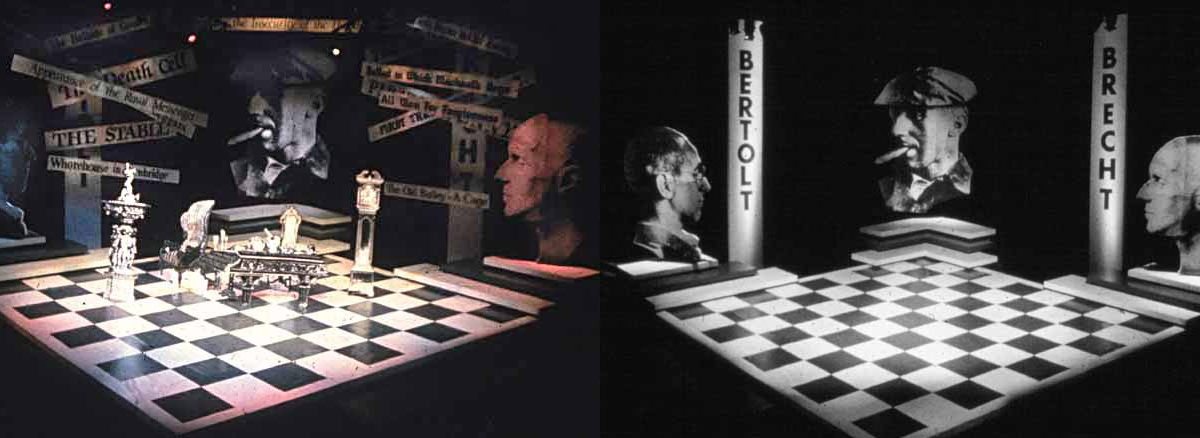BRECHT THEATRE WORKSHOP

Duration:
Various ( 1 Hour - Full Day)Suitability:
Grades 10 - 12Available Terms:
Terms 1 - 4BRECHT THEATRE WORKSHOP
Venue: Double Teaching Space, Drama Room, Studio, Theatre, Hall
A hands-on immersion into the revolutionary world of Epic Theatre. Step into the world of Bertolt Brecht and his radical concept of Epic Theatre. This workshop offers students the opportunity to explore Brecht’s theatrical style and techniques that challenge the traditional storytelling model and reframe the theatre as a space for social critique and political discourse.
Through physical exercises, ensemble-based activities, and scene devising, students will learn how to apply Brechtian tools — narration, direct address, placards, projection, disjointed time, and anti-illusionary devices — to create engaging, thought-provoking theatre that asks audiences not to feel, but to think.
Australian Curriculum Links
Target Years: 7–12
Supports learning in The Arts – Drama, English, Humanities and Social Sciences (HASS), and General Capabilities.
The Arts – Drama
Years 7–10 | Strands:
- Developing Understanding and Practices
➤ Investigate and apply non-naturalistic performance styles, including Epic Theatre and the techniques of Bertolt Brecht
➤ Rehearse and refine performances that break the fourth wall, use projection and placards, and challenge audience expectations
(ACADRM043, ACADRM049) - Responding and Interpreting
➤ Analyse how Brecht’s techniques alter audience engagement and meaning
➤ Reflect on how theatrical devices can communicate social and political themes
(ACADRR046, ACADRR051)
Senior Secondary – Drama (Years 11–12):
- Explore Epic Theatre conventions, including narration, direct address, stylised gesture, fragmentation, and alienation
- Devise and present original scenes inspired by Brecht’s philosophies
- Analyse how performance choices impact audience perception and invite critical reflection
English
Years 7–10 | Strands:
- Language for Interaction / Literature
➤ Interpret and critique texts that use irony, commentary, and stylised performance techniques
➤ Examine how text and performance can reveal ideologies, challenge power structures, or promote empathy
(ACELY1741, ACELT1635, ACELY1811)
Humanities and Social Sciences (HASS)
- Explore connections between historical context, such as World War II, Marxism, capitalism, and social reform, and how they informed Brecht’s theatre
- Analyse how performance can reflect and interrogate political systems, ethics, and social justice issues
(ACDSEH107, ACDSEH108, ACDSEH121)
General Capabilities
Critical and Creative Thinking
- Question traditional narrative structures
- Create and analyse scenes using disruption, contrast, and juxtaposition
- Use visual signs, time jumps, and actor commentary to provoke thought
Ethical Understanding
- Explore justice, inequality, power, and accountability through theatrical storytelling
- Evaluate character decisions and societal systems through a political lens
Personal and Social Capability
- Build confidence through direct audience engagement
- Develop collaborative skills in ensemble devising
- Cultivate empathy and analysis by stepping into roles that challenge personal beliefs
Core Workshop Components & Experiences
- Epic Theatre Foundations: Overview of Brecht’s life, context, and the theory of Epic Theatre
- Alienation Techniques (Verfremdungseffekt): Mastering distancing techniques to prevent audience emotional absorption
- Narration & Commentary: Using monologues and narration to shape audience perspective
- Direct Address & Fourth Wall Breaks: Connecting with the audience as thinkers, not passive viewers
- Placards, Projections & Slogans: Embedding visual tools that deliver message and meaning
- Devised Scene Work: Collaborative development of short, socio-political performance pieces using Brechtian conventions
- Disrupted Chronology: Working with fractured timelines to challenge narrative expectation
- Gestus: Expressing social commentary through stylised physicality and gesture
- Critical Reflection: Discussing the audience’s role in interpreting, not consuming, theatre
Style and Form
- Epic Theatre / Non-Naturalism – symbolic, socially engaged performance
- Direct Address / Narration – actor as commentator and truth-teller
- Devised Theatre – students create original short scenes using provocations
- Physicalisation of Politics – exploring “Gestus” and embodiment of message
Learning Outcomes
By the end of the workshop, students will:
- Understand and apply Brechtian principles to devised performance
- Recognise how form and style impact meaning
- Develop confidence using non-traditional performance techniques
- Create work that fosters critical thinking, not passive empathy
- Reflect on theatre’s role as a platform for political dialogue and social change
Workshop Adaptability
This workshop can be tailored for:
- Introductory Brecht units in Years 9–10
- Senior devised work and performance analysis in Years 11–12
- Cross-curricular projects between Drama, English, and Humanities
- Focused intensives leading into performance assessment tasks or public showings
Devised by: Clint Bolster
Directed by: Clint Bolster